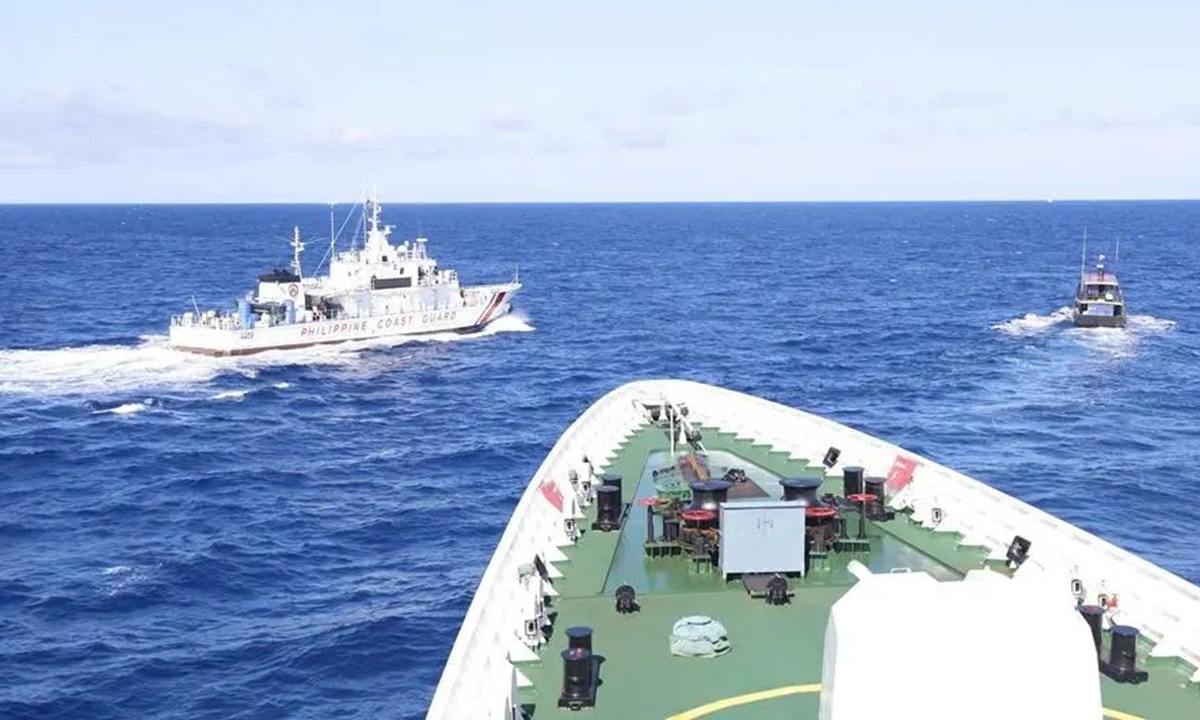
China Coast Guard drives away Philippine vessels intruding into waters of China's Nansha Islands
The China Coast Guard (CCG) announced on Saturday that it had expelled three Philippine vessels which had illegally intruded into waters adjacent to Ren'ai Jiao (also known as Ren'ai Reef) in China's Nansha Islands, noting that the CCG remains on full alert to safeguard China's territorial sovereignty and maritime rights and interests.
Experts pointed out that Philippines' frequent illegal intrusions are testing China's limits but the country may have exhausted all its tricks. They urged the Philippines to adhere to commitments and stop provocation, which is the only way to resolve the South China Sea disputes.
Gan Yu, a spokesperson for CCG, said that the Philippines sent two coast guard vessels and one supply vessel to illegally enter the waters near Ren'ai Jiao on Saturday, in an attempt to supply its illegally grounded warship and transport construction materials, deliberately disrupting the peace and stability of the South China Sea.
Gan noted that despite multiple warnings and route controls from the Chinese side, the Philippine supply vessel forcibly intruded into waters adjacent to Ren'ai Jiao on Saturday, and the CCG lawfully and professionally implemented regulation, interception, and expulsion.
The Philippines' provocation came only 18 days after
its last shipment, the spokesperson said.
The spokesperson warned the Philippines that those who play with fire will only bring shame upon themselves. "The CCG is on high alert at all times to resolutely defend national territorial sovereignty and maritime rights and interests," Gan noted.
Chinese Foreign Ministry also said on Saturday that the Nansha Islands, including Ren'ai Jiao, are China's inherent territory, which has been formed and established in the long historical process and is in accordance with international law. The Philippines side should immediately stop provocations, and avoid disrupting the peace and stability of the South China Sea.
If the Philippines continues to act recklessly, China will take resolute measures to safeguard its territorial sovereignty and maritime rights and interests. The Philippines will be responsible for all resulting consequences, Chinese Foreign Ministry said.
Experts reached by the Global Times on Saturday pointed out that the Philippines' frequent illegal intrusions are testing China's limits, and they also warned of the increasing likelihood of more frictions created by the country.
"The Philippines' illegal intrusions into the waters near Ren'ai Jiao are a form of consistent provocations by the country, aimed at testing China's bottom line on this matter and probing the US' response," Hu Bo, director of the South China Sea Strategic Situation Probing Initiative (SCSPI), told the Global Times.
"The Philippines may have exhausted all its tricks," Hu said on Saturday, adding that the possibility of a provocative escalation is not high. However, there may be more friction in the future as the Philippines shows no signs of stopping its provocations, the expert warned.
The Philippines has been frequently provoking tensions in the South China Sea recently by challenging China's sovereignty and maritime rights over the relevant islands and reefs. Some 34
Filipino personnel illegally landed on Tiexian Jiao (also known as Tiexian Reef) in the South China Sea on Thursday after ignoring warnings and dissuasion from the Chinese side, and the CCG's law enforcement personnel boarded the reef to investigate and handle the situation in accordance with the law.
According to the Associated Press, Philippine coast guard Commodore Jay Tarriela said at a news conference on Friday that the personnel landed on Tiexian Jiao were "marine scientists" conducting research.
Chinese experts said sending questionable "marine scientists" amid escalated tensions is hardly the way to solve the South China Sea dispute and only strengthens the impressions that the Philippines is actively trying to occupy the uninhabited reef and further provoke China.
According to the Declaration on the Conduct of Parties in the South China Sea (DOC), the Parties undertake to exercise self-restraint in the conduct of activities that would complicate or escalate disputes and affect peace and stability, including refraining from action of inhabiting on the presently uninhabited islands, reefs, shoals, cays, and other features.
The Philippines' move violates the commitment in the DOC that all parties should not occupy uninhabited islands and reefs, which is the core of the declaration and a key factor in maintaining peace and stability in the South China Sea for the past two decades, Lei Xiaolu, a professor of law in China Institute of Boundary and Ocean Studies, Wuhan University, told the Global Times on Saturday.
The expert emphasized that China has indisputable sovereignty over the Nansha Islands, including Tiexian Jiao, and adjacent waters. "There is no international law that justifies a country conducting 'scientific research' on the territory of another sovereign nation," Lei said.
From last year onward, the Philippines has been engaging in increasingly provocative activities with the goal of illegally occupying some of China's reefs, and these aggressive behaviors are the primary cause of the escalating tensions in the South China Sea, analysts said. The Philippines should adhere to its commitments and stop provocation, which is the only way to resolve the South China Sea dispute, they said.




